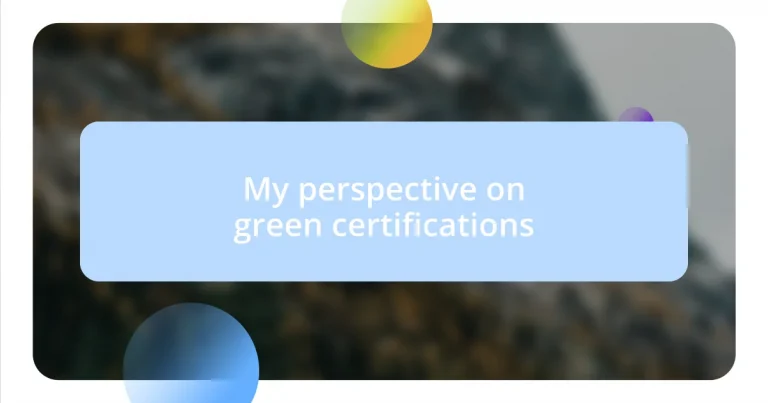Key takeaways:
- Green certifications enhance consumer trust and differentiate businesses by validating their commitment to environmentally friendly practices.
- Achieving green certifications involves overcoming challenges such as costs, complex requirements, and maintaining compliance, but can lead to long-term benefits and savings.
- Future trends indicate a push for greater transparency and collaboration among businesses, alongside the integration of technology to simplify the certification process.

Introduction to green certifications
Green certifications are designed to validate and promote environmentally friendly practices in various industries, from construction to food production. I remember when I first learned about LEED certification in a college class; it opened my eyes to the impact our built environment can have on the planet. Isn’t it fascinating how these certifications can drive change and innovation while helping consumers make informed choices?
What struck me most was the range of options available—there’s something for everyone. Whether it’s energy efficiency, sustainable sourcing, or waste reduction, each certification serves as a badge of honor for businesses committed to making a difference. Think about it: when you see a product labeled as organic or a building marked with a green certification, doesn’t it inspire a sense of trust and accountability in the brand?
These certifications often require rigorous assessments and ongoing commitments, which can feel daunting. I’ve personally witnessed companies transform their operations to qualify for these labels, leading to incredible sustainability initiatives. It’s a journey that not only benefits the environment but also enhances brand loyalty and consumer trust—what’s not to love about that?
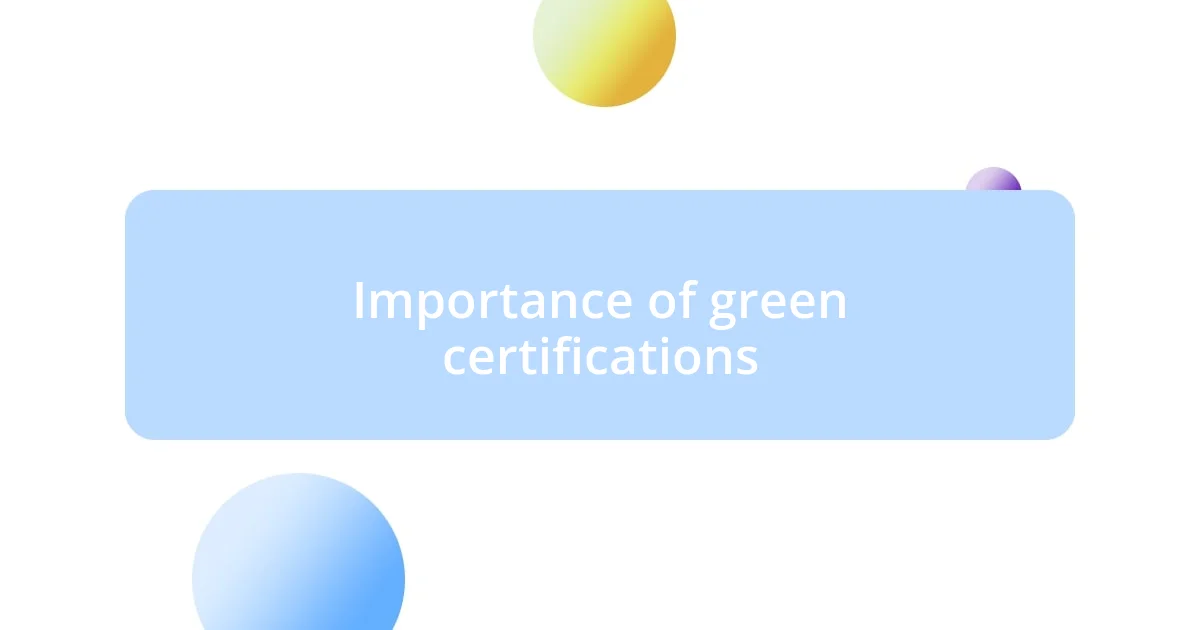
Importance of green certifications
The importance of green certifications cannot be overstated. They serve as a critical link between businesses and environmentally conscious consumers. I still recall my excitement when I discovered that a local café received a green certification. It made me feel good about supporting a business that cares about its ecological footprint. There’s a certain peace of mind when you know that your purchasing choices align with your values.
Here are some key reasons why green certifications matter:
- Trust and credibility: Consumers rely on these certifications to guide their purchasing decisions, fostering trust in brands.
- Encouragement for sustainable practices: Companies often implement more environmentally friendly processes to meet certification standards.
- Market differentiation: Green certifications can set businesses apart in competitive markets, appealing to eco-conscious consumers.
- Long-term savings: Implementing sustainable practices usually leads to reduced operational costs over time.
- Regulatory benefits: Some certifications can offer advantages in complying with environmental regulations, reducing the risk of penalties.
These factors solidify how green certifications play a pivotal role in promoting sustainability, enhancing consumer trust, and ultimately leading to a healthier planet.
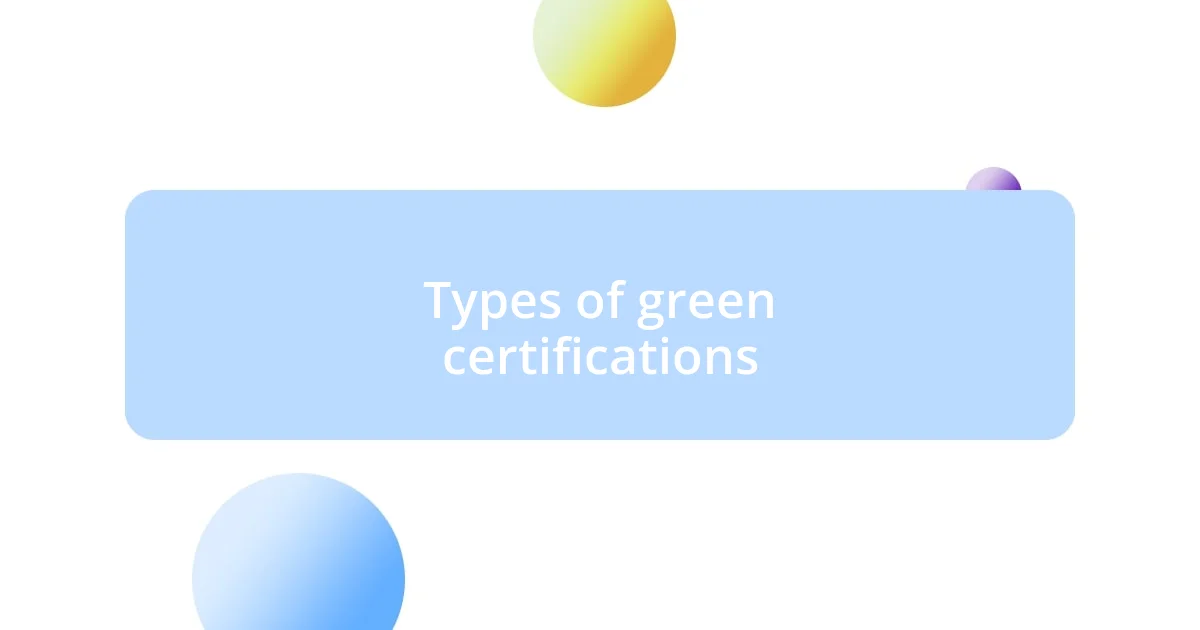
Types of green certifications
Green certifications come in various types, tailored to specific industries and sustainability goals. For instance, the Leadership in Energy and Environmental Design (LEED) certification is a prominent standard for green buildings, focusing on energy efficiency and sustainable site development. I remember being amazed at how a local school retrofit its facilities after earning LEED certification—seeing the tangible benefits made the concept of sustainability feel so much more real.
Another notable certification is the Forest Stewardship Council (FSC) stamp, which ensures that wood products are sourced from responsibly managed forests. I’ve often found myself gravitating towards FSC-certified furniture in my home, knowing it not only beautifies my space but also supports responsible forestry practices. It’s little choices like these that connect us to broader ecological narratives, don’t you think?
There are also food-related certifications, such as USDA Organic, which assures consumers that the products meet strict guidelines for organic ingredients and sustainable farming practices. I still recall the sense of satisfaction when I chose organic fruits at a farmers’ market; knowing the farmers prioritized their environmental impact made my purchase feel meaningful. Each type of green certification plays a crucial role, weaving together the fabric of sustainability in our everyday choices.
| Certification Type | Focus |
|---|---|
| LEED | Green building and energy efficiency |
| FSC | Responsible forestry practices |
| USDA Organic | Sustainable farming practices |
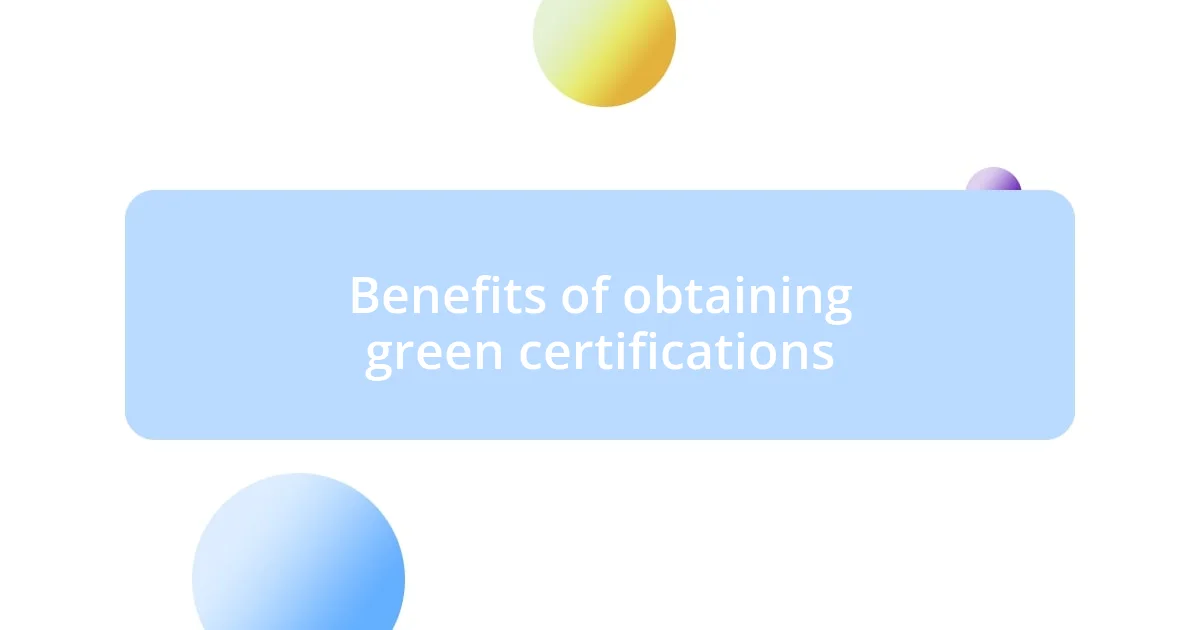
Benefits of obtaining green certifications
Obtaining green certifications can significantly enhance a business’s reputation in the eyes of consumers. When I first learned about a local retailer’s green certification, it shifted my perception entirely. Suddenly, I felt a deeper connection to their products, as if they were telling a story of care for the planet. Isn’t that what many of us are looking for—brands that align with our values?
Additionally, achieving these certifications often prompts businesses to reevaluate their practices, leading to more sustainable operations. I remember speaking with a restaurant owner who pursued a green certification and was genuinely surprised by how much waste they could reduce just by optimizing their processes. It’s fascinating how a little commitment can yield substantial changes for both the environment and the bottom line, don’t you think?
Long-term savings can also emerge from going green. After all, implementing energy-efficient systems usually leads to lower utility bills. I’ve personally witnessed how a friend’s decision to invest in solar panels for her home not only reduced her energy costs but also increased her property value. It’s moments like these that illustrate how eco-friendly choices can benefit us financially while fostering a healthier planet.
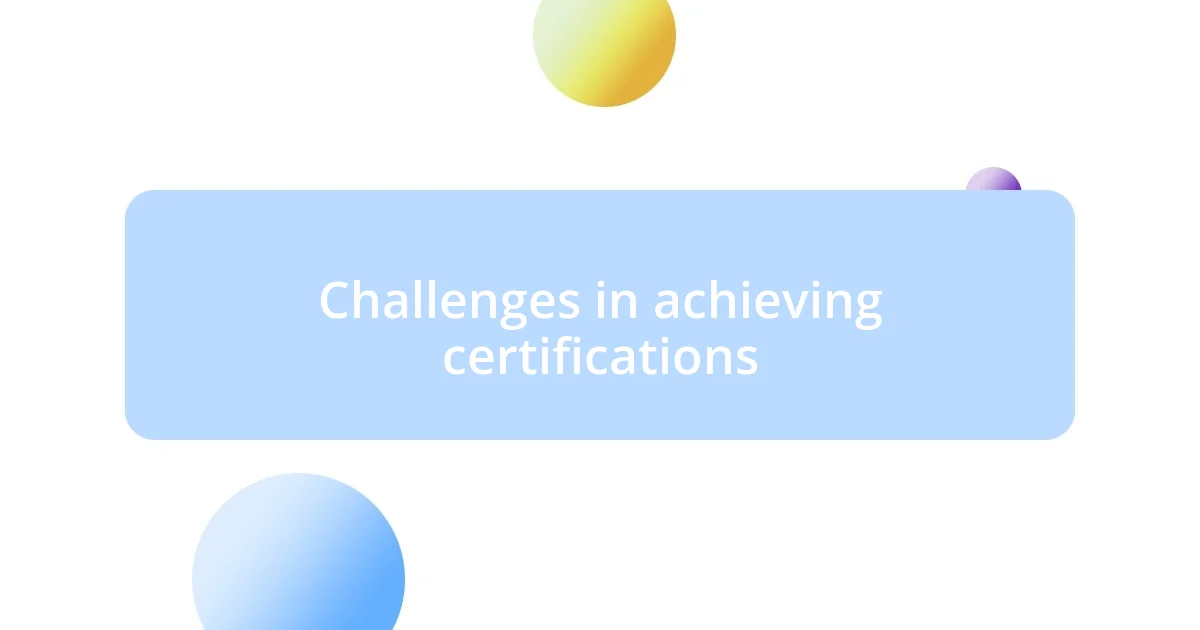
Challenges in achieving certifications
Achieving green certifications can feel like navigating a maze. One major challenge is the cost involved; I remember feeling overwhelmed when a local business I know looked into LEED certification. The upfront investments in infrastructure and training seemed daunting, but they also understood that the long-term benefits could outweigh these initial hurdles. How do you weigh immediate costs against future gains?
Another hurdle is the complex requirements that vary across certifications. It’s like trying to decipher a foreign language! I once consulted for a small cafe aiming for USDA Organic certification, and they faced a mountain of documentation that felt never-ending. The detailed regulations are necessary, but they can be discouraging for businesses just embarking on their sustainability journey. What can be done to simplify this process, I often wonder?
Lastly, there’s the challenge of maintaining compliance after achieving certification. I’ve encountered businesses that celebrated their certification but then struggled to keep up with the rigorous standards that follow. The pressure to continuously meet expectations can be stressful, especially for smaller companies. It makes me think—how do we ensure that sustainability becomes a natural part of the business practice rather than just a box to check?
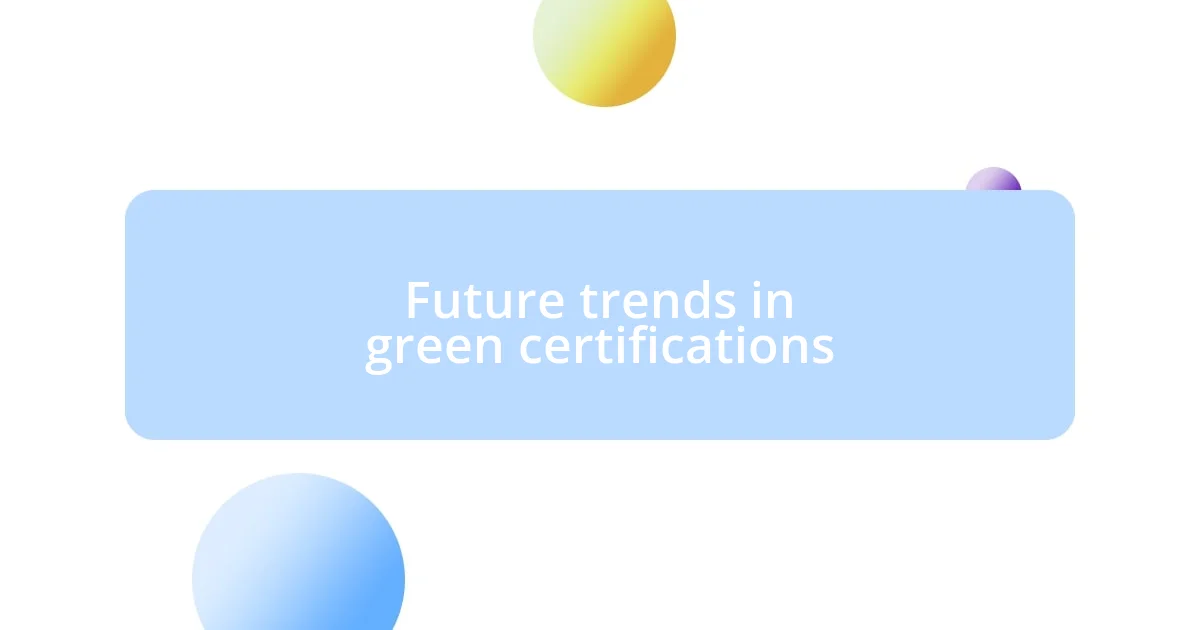
Future trends in green certifications
As we look to the future, I see an exciting trend where green certifications will become more integrated into global supply chains. I recently read about companies collaborating to share their sustainability efforts, making it easier for smaller businesses to join in. It raises an important question: can collective resources lead to more widespread adoption of eco-friendly practices? Personally, I believe this could transform the landscape of green certifications, creating a more supportive environment for those eager to make a positive impact.
I also foresee an increase in consumer demand for transparency regarding the certifications that businesses claim. When I followed a brand’s journey towards zero-waste practices, I was surprised by how much I appreciated their candidness about the steps they were taking. I think many consumers want to know the story behind the label, prompting businesses to communicate not just their certifications but also the journey and challenges they faced in obtaining them. Isn’t that a fascinating shift towards valuing authenticity?
Moreover, technology will likely play a significant role in the evolution of green certifications. Recently, I stumbled upon an app that helps businesses track their sustainable practices in real-time. Such innovations could simplify the certification process, making it more accessible to a wider array of industries. I can’t help but wonder: how might these advancements reshape our perceptions of what it means to be genuinely green? The potential for meaningful connections between technology and sustainability excites me, and I believe we are on the cusp of a significant transformation in this area.












